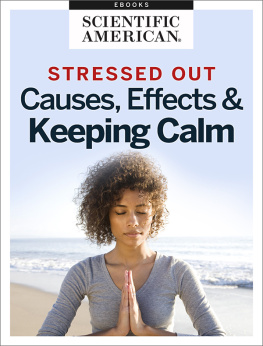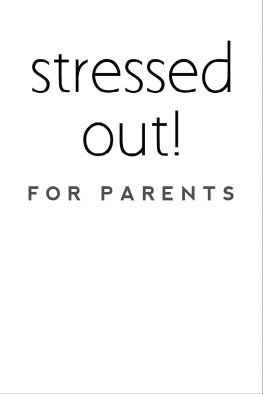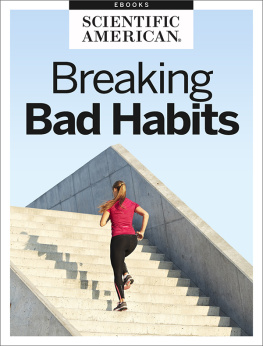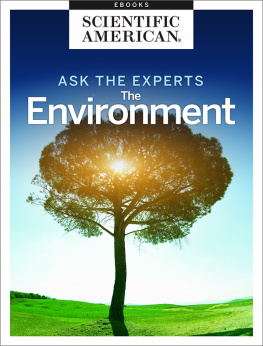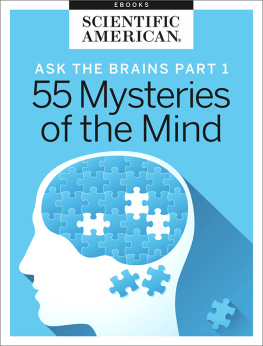Editors of Scientific American - Stressed out - causes, effects & keeping calm
Here you can read online Editors of Scientific American - Stressed out - causes, effects & keeping calm full text of the book (entire story) in english for free. Download pdf and epub, get meaning, cover and reviews about this ebook. genre: Romance novel. Description of the work, (preface) as well as reviews are available. Best literature library LitArk.com created for fans of good reading and offers a wide selection of genres:
Romance novel
Science fiction
Adventure
Detective
Science
History
Home and family
Prose
Art
Politics
Computer
Non-fiction
Religion
Business
Children
Humor
Choose a favorite category and find really read worthwhile books. Enjoy immersion in the world of imagination, feel the emotions of the characters or learn something new for yourself, make an fascinating discovery.
- Book:Stressed out - causes, effects & keeping calm
- Author:
- Genre:
- Rating:3 / 5
- Favourites:Add to favourites
- Your mark:
- 60
- 1
- 2
- 3
- 4
- 5
Stressed out - causes, effects & keeping calm: summary, description and annotation
We offer to read an annotation, description, summary or preface (depends on what the author of the book "Stressed out - causes, effects & keeping calm" wrote himself). If you haven't found the necessary information about the book — write in the comments, we will try to find it.
Editors of Scientific American: author's other books
Who wrote Stressed out - causes, effects & keeping calm? Find out the surname, the name of the author of the book and a list of all author's works by series.
Stressed out - causes, effects & keeping calm — read online for free the complete book (whole text) full work
Below is the text of the book, divided by pages. System saving the place of the last page read, allows you to conveniently read the book "Stressed out - causes, effects & keeping calm" online for free, without having to search again every time where you left off. Put a bookmark, and you can go to the page where you finished reading at any time.
Font size:
Interval:
Bookmark:

Stressed Out:
Causes, Effects and Keeping Calm
From the Editors of Scientific American
Cover Image: Jacqueline Veissid/GettyImages
Letters to the Editor
Scientific American
One New York Plaza
Suite 4500
New York, NY 10004-1562
or editors@sciam.com
Copyright 2020 Scientific American, a division of Springer Nature America, Inc.
All rights reserved.
Published by Scientific American
www.scientificamerican.com
ISBN: 978-1-948933-22-3


STRESSED OUT:
CAUSES, EFFECTS AND KEEPING CALM
From the Editors of Scientific American
Table of Contents
Section 1
1.1
by Hermann Englert
1.2
by Clancy Blair
1.3
by Anna Harwood
Section 2
2.1
by Melinda Wenner
2.2
by Coco Ballantyne
2.3
by Debra A. Bangasser
2.4
by Diana Kwon
Section 3
3.1
by Amy Arnsten, Carolyn M. Mazure & Rajita Sinha
3.2
by Brian Mossop
3.3
by Jim Hopper
3.4
by Jo Marchant
Section 4
4.1
by Krystal D'Costa
4.2
by Michael P. Leiter & Christina Maslach
4.3
by Jillian Mock
Section 5
5.1
by Robert Epstein
5.2
by Ashten Duncan
5.3
by Elaine Fox
5.4
by Bret Stetka
5.5
by Matthieu Ricard, Antoine Lutz & Richard J. Davidson
Section 6
6.1
by Steven M. Southwick & Dennis S. Charney
6.2
by Gary Stix
6.3
by Steve Taylor
6.4
by Lydia Denworth
Sussing Out Stress
by Hermann Englert
Road rage, heart attacks, migraine headaches, stomachulcers, irritable bowel syndrome, hair lossamong womenstress is blamed for all those andmany other ills. Nature provided our prehistoricancestors with a tool to help them meet threats: aquick activation system that focused attention,quickened the heartbeat, dilated blood vessels andprepared muscles to fight or flee the bear stalkinginto their cave. But we, as modern people, are subjectedto stress constantly from commuter traffic,deadlines, bills, angry bosses, irritable spouses, noise,as well as social pressure, physical sickness andmental challenges. Many organs in our bodies areconsequently hit with a relentless barrage of alarmsignals that can damage them and ruin our health.
What exactly happens in our brains and bodieswhen we are under stress? Which organs areactivated? When do the alarms begin to cause criticalproblems? We are only now formulating a coherentmodel of how ongoing stress hurts us, yetin it we are finding possible clues to counteractingthe attack.
The Road to Overload
In recent decades, researchers have identifiedmany parts of the brain and body that contributeimportantly to the stress reactionthe way we respondto external stressors. These regions processsensory and emotional information and communicatewith a wide network of nerves, organs,blood vessels and muscles, reallocating the bodysenergy reserves so that we can assess and respondto situations.
When stress begins, a small area deep in thebrain called the hypothalamus pulls the strings. Itcontains several different nuclei, or collections ofneurons, that undertake various tasks. They regulatesleep and appetite, for example, and the balanceamong different hormones. The most criticalcollection of neurons is the paraventricular nucleus,which secretes corticotropin-releasing hormone(CRH), a messenger compound that unleashesthe stress reaction.
CRH was discovered in 1981 by Wylie Valeand his colleagues at the Salk Institute for BiologicalStudies in San Diego and since then has beenwidely investigated. It controls the stress reactionin two ways.
Primarily, it reaches organs via the so-called long armthe hormone signal pathway from the hypothalamus to the pituitary gland in the brain and to the adrenal glands on the kidneys. This long arm is also known as the hypothalamus-pituitary-adrenal axis.
The arrival of CRH tells the pituitary to releaseadrenocorticotropic hormone (ACTH) into thebloodstream. ACTH, in turn, activates the adrenalglands to release glucocorticoid hormones intothe blood. Levels of glucocorticoids typically followa daily rhythm: high in the early morning,lower late in the day. One of their most importanttasks is to increase glucose in the blood to provideenergy for muscles and nerves. They also controlglucose metabolism and the sleep-wake cycle. Becausehormones regulate such critical functions,their levels have to be precisely controlled, andthey are thus subject to a feedback mechanism inthe hypothalamus, which can quickly return thesystem to lower values.
CRH also makes its effects felt by acting on theshort arm pathway. A small region in the brainstem termed the locus coeruleus functions as akind of neural relay station. It links the CRH-producingbrain regions with the autonomic nervoussystem, which governs the ongoing physiologicalprocesses we never have to think about, such asbreathing, blood pressure, digestion and so on.
The stress response system produces positivefeedback to strengthen its own action when needed,but when daily stress builds up, it can becomeunnecessarily intense and sustained. Whether theresponse is appropriate or not depends on cellsthat coat the pituitary gland and other parts of thesystem. CRH sends signals into these cells bydocking with type 1 receptor molecules on thecells membranes. Researchers at the Salk Instituteand at the Max Planck Institute of Psychiatry inMunich bred mice in which type 1 receptors werelacking. Even when these mice were repeatedly exposed to stressful situations, levels of certain stresshormones in their blood never rose above normal.The animals obviously felt less stressed. Perhapsdrugs that suppress the effects of CRH on these receptorsmight reduce stress levels in harried humans,too.
Turning On
Stress signals change the physiological states of many organs, including the heart, kidneys, stomach and reproductive system, as well as muscles. The hypothalamus receives sensory stressors (such as seeing a bear) from nerves. The locus coeruleus (blue spot) delivers emotional stressors (such as worrying about the bears teeth) from the amygdala to the paraventricular nucleus. That structure makes corticotropin-releasing hormone (CRH), the most important stress hormone, which tells the pituitary gland to send impulses via nerves such as the vagus and to release other hormones into the bloodstream. Those hormones activate the adrenal glands, which raise blood pressure and increase glucose levels in the blood, providing energy to fight or flee.

Credit: Illustration by Thomas Braun G&G
Organs Break Down
Our new knowledge of the stress system providesstrong clues as to how stress can make ussick and how we might counteract its effects. Fora mouse or human, any activation of the stress systemcounts as an extraordinary eventand whenthe emergency ends, the system must quickly beturned off so that the affected organs can recover.But when external circumstances stimulate thestress system repeatedly, it never stops reacting,and organs are never allowed to relax.
Such chronic strain leaves many tissues vulnerableto damage. The reproductive organs, forexample, often become less effective. Research indicatesthat male and female athletes and balletdancers who subject themselves to great physicaldemands over many years produce fewer sperm oregg cells. Male testosterone levels decline, and female menstrual cycles may become disordered oreven cease.
Font size:
Interval:
Bookmark:
Similar books «Stressed out - causes, effects & keeping calm»
Look at similar books to Stressed out - causes, effects & keeping calm. We have selected literature similar in name and meaning in the hope of providing readers with more options to find new, interesting, not yet read works.
Discussion, reviews of the book Stressed out - causes, effects & keeping calm and just readers' own opinions. Leave your comments, write what you think about the work, its meaning or the main characters. Specify what exactly you liked and what you didn't like, and why you think so.

